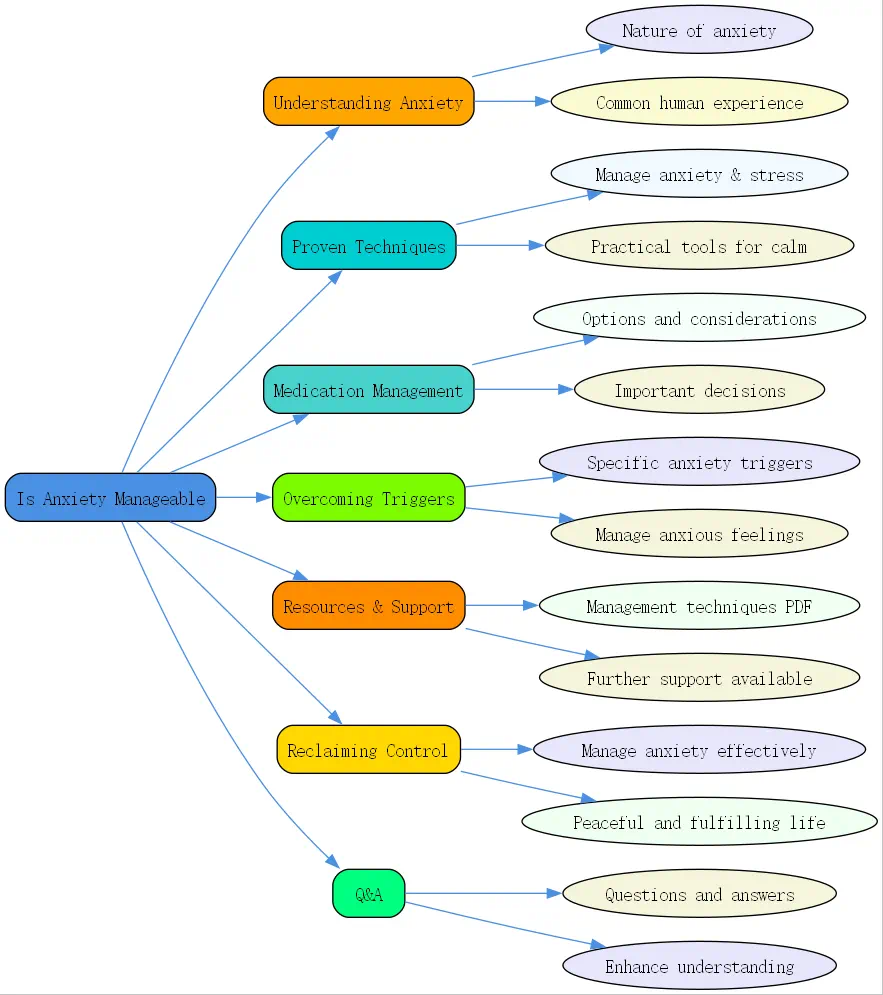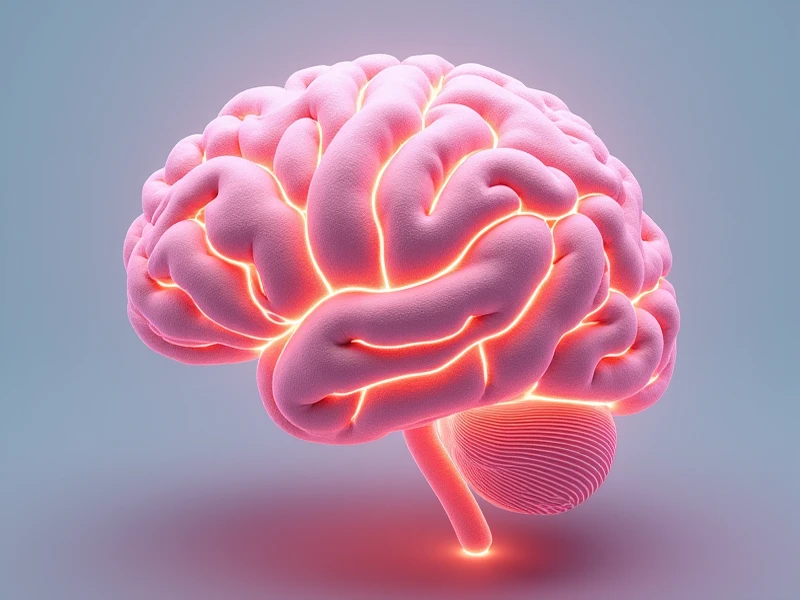Is Anxiety Manageable? A Comprehensive Guide to Conquering Your Fears

Anxiety can feel like an overwhelming storm, clouding your thoughts and impacting your daily life. It’s a common human experience, often characterized by persistent worry, fear, and physical tension. But amidst the struggle, a crucial question arises: is anxiety manageable? The resounding answer is yes. While anxiety might be a part of life for many, it doesn’t have to dictate your existence. With the right understanding, strategies, and support, you can learn to navigate its challenges and reclaim a sense of calm and control.
This guide, brought to you by BrainTalking, explores the nature of anxiety, delves into effective management techniques, discusses medication options, and points you toward valuable resources. We aim to empower you with knowledge and practical tools, drawing parallels from specific fears, like dental anxiety, to illustrate broader principles of managing anxious feelings effectively. Understanding and addressing anxiety is the first step towards a more peaceful and fulfilling life.
Understanding Anxiety
Defining Anxiety and Its Impact
Anxiety is more than just feeling stressed before a big event. It’s a complex emotional and physiological response involving excessive worry, apprehension, and fear, often about future uncertainties or perceived threats. This response can manifest physically (racing heart, sweating, trembling, fatigue), emotionally (irritability, restlessness, dread), and cognitively (difficulty concentrating, racing thoughts, catastrophizing). Left unmanaged, chronic anxiety can significantly impact relationships, work performance, physical health, and overall quality of life, sometimes leading individuals to avoid situations that trigger their symptoms.
Common Sources of Anxiety
Anxiety doesn’t stem from a single cause; it’s often a result of a combination of factors. Genetic predisposition can play a role, as can brain chemistry imbalances. Environmental factors are significant triggers, including stressful life events (job loss, relationship issues, financial worries), past traumatic experiences, or even learned behaviors from family members. Just as fear of pain or negative past experiences can cause dental anxiety, broader life challenges can fuel generalized anxiety. Recognizing potential sources is a key step in understanding and managing your specific experience with anxiety.
The Importance of Addressing Anxiety
Ignoring anxiety rarely makes it disappear; often, it intensifies over time. Proactively addressing anxiety is crucial not only for improving mental well-being but also for preventing potential long-term health consequences associated with chronic stress, such as cardiovascular problems or weakened immune function. Learning effective management strategies empowers you to face challenges rather than avoid them, fostering resilience and improving your ability to engage fully in life. Seeking help is a sign of strength, not weakness, and the first step towards managing this condition effectively.
Proven Techniques to Manage Anxiety and Stress
Finding effective tips to manage anxiety and stress involves exploring various strategies to calm both the mind and body. A multi-faceted approach often yields the best results, combining immediate coping mechanisms with long-term lifestyle adjustments and professional support.
Relaxation Techniques for Anxiety Management
Learning to consciously relax your body and mind is fundamental to anxiety management. These techniques can be practiced anywhere, providing immediate relief during moments of heightened stress.
- Deep Breathing Exercises: When anxious, breathing often becomes shallow and rapid. Deep, diaphragmatic breathing helps counteract this physiological stress response. Try the 4-4-4 technique mentioned in managing situational fears: inhale slowly through your nose for four counts, hold gently for four, and exhale slowly through your mouth for four. Repeating this several times signals safety to your nervous system, promoting calmness.
- Meditation and Mindfulness Practices: Mindfulness involves paying attention to the present moment without judgment. Meditation, a form of mindfulness, trains your focus and reduces mind-wandering. Even short daily sessions (5-10 minutes) using guided meditation apps or simply focusing on your breath can significantly decrease overall anxiety levels over time. It helps you observe anxious thoughts without getting carried away by them. [Link to BrainTalking article on Mindfulness]
- Visualization Techniques: Guided imagery or visualization involves creating calming mental scenes. Imagine yourself in a peaceful place 閳?a quiet beach, a serene forest. Engage all your senses in this mental escape: what do you see, hear, smell, feel? This technique distracts from anxious thoughts and promotes a state of relaxation, helping your body feel at ease so your mind can follow.
Lifestyle Changes for Anxiety Reduction
Long-term anxiety management often requires adjustments to daily routines and habits. These changes support overall well-being and build resilience against stress.
- Regular Exercise and Physical Activity: Physical activity is a powerful anxiety reliever. Exercise releases endorphins (natural mood lifters) and helps burn off nervous energy. Aim for at least 30 minutes of moderate-intensity exercise most days of the week. Activities like walking, jogging, swimming, yoga, or dancing can significantly reduce anxiety symptoms.
- Healthy Diet and Nutrition: What you eat can influence your mood. A balanced diet rich in fruits, vegetables, whole grains, and lean protein supports stable blood sugar and energy levels. Conversely, excessive caffeine, sugar, and processed foods can exacerbate anxiety symptoms in some individuals. Staying hydrated is also crucial for optimal brain function.
- Sufficient Sleep and Rest: Anxiety and sleep problems often go hand-in-hand, creating a difficult cycle. Prioritizing sleep hygiene 閳?maintaining a consistent sleep schedule, creating a relaxing bedtime routine, ensuring a dark and quiet sleep environment 閳?is essential. Aim for 7-9 hours of quality sleep per night to help regulate mood and improve coping ability.


Seeking Support and Therapy
You don’t have to manage anxiety alone. Connecting with others and seeking professional guidance are vital components of effective management.
- The Role of Counseling and Therapy: Therapies like Cognitive Behavioral Therapy (CBT) and Acceptance and Commitment Therapy (ACT) are highly effective for anxiety. A therapist can help you identify negative thought patterns, develop coping skills, and understand the roots of your anxiety. Finding a mental health professional who understands anxiety, much like finding an empathetic dentist for dental fear, makes a significant difference. [Link to BrainTalking page on Therapy Options]
- Support Groups and Peer Support: Connecting with others who share similar experiences can reduce feelings of isolation. Support groups provide a safe space to share challenges, exchange coping strategies, and receive encouragement. Knowing you’re not alone can be incredibly validating and empowering.
- Communicating with Loved Ones: Openly discussing your anxiety with trusted friends or family can provide essential emotional support. Just as bringing a support person to a stressful appointment can help, having understanding loved ones in your life offers reassurance. Clearly communicate what support you need, whether it’s a listening ear or help with specific tasks.
Anxiety Medication Management: Options and Considerations
For some individuals, particularly those with moderate to severe anxiety, medication can be a valuable part of the treatment plan, often used in conjunction with therapy and lifestyle changes. Effective anxiety medication management requires careful consideration and collaboration with a healthcare professional.
Overview of Anxiety Medications
Medications for anxiety work by helping to rebalance brain chemicals involved in mood and stress regulation. They don’t cure anxiety but can significantly reduce symptoms, making it easier to engage in therapy and daily life. The decision to use medication is personal and should be made after discussing potential benefits and risks with a doctor or psychiatrist. Think of it like sedation dentistry in the reference text 閳?an option for more significant challenges, used under professional guidance.
Types of Medications Used to Treat Anxiety
Several classes of medications are commonly prescribed for anxiety:
- Selective Serotonin Reuptake Inhibitors (SSRIs): Often the first-line treatment, SSRIs (e.g., fluoxetine, sertraline, escitalopram) work by increasing serotonin levels in the brain. They are generally used for long-term management.
- Serotonin-Norepinephrine Reuptake Inhibitors (SNRIs): Similar to SSRIs, SNRIs (e.g., venlafaxine, duloxetine) affect both serotonin and norepinephrine.
- Benzodiazepines: These medications (e.g., diazepam, lorazepam, alprazolam) provide rapid relief from acute anxiety symptoms. However, due to the potential for dependence and tolerance, they are typically prescribed for short-term use or on an as-needed basis.
- Beta-Blockers: Primarily used for heart conditions, beta-blockers (e.g., propranolol) can help manage physical symptoms of anxiety like rapid heartbeat and trembling, particularly in performance anxiety situations.
- Buspirone: This medication is used for chronic anxiety and has a lower risk of dependence than benzodiazepines, but it takes several weeks to become fully effective.
Working with a Healthcare Professional for Medication Management
Effective anxiety medication management is a collaborative process. Your doctor or psychiatrist will consider your specific symptoms, medical history, and other medications you’re taking before prescribing anything. Regular follow-up appointments are crucial to monitor effectiveness, adjust dosage if necessary, and manage any side effects. Never adjust your dose or stop taking medication without consulting your healthcare provider, as abrupt changes can cause withdrawal symptoms or a return of anxiety. Communication is key 閳?be open about how you’re feeling and any concerns you have.
Potential Side Effects and Risks
All medications have potential side effects, which vary depending on the drug type and the individual. Common side effects of SSRIs/SNRIs can include nausea, headache, drowsiness, or insomnia, often diminishing over time. Benzodiazepines can cause drowsiness, dizziness, and impaired coordination, and carry risks of dependence and withdrawal. Discuss all potential side effects and risks thoroughly with your provider to make an informed decision about your treatment.
Overcoming Specific Anxiety Triggers
While general anxiety management techniques are helpful, understanding and addressing your unique triggers is crucial for long-term success.
Identifying Your Personal Triggers
Triggers are specific situations, thoughts, places, or even physical sensations that provoke anxiety symptoms. They can be obvious (public speaking, confined spaces) or subtle (a particular smell, time of day). Keeping an anxiety journal 閳?noting when anxiety spikes, what you were doing, thinking, or feeling 閳?can help uncover patterns and identify your personal triggers, much like recognizing the dental office environment as a trigger for dental anxiety.
Developing Coping Strategies for Specific Situations
Once triggers are identified, you can develop targeted coping strategies. If social situations trigger anxiety, you might practice conversation starters or use deep breathing before entering a gathering. If deadlines cause stress, breaking tasks into smaller steps can help. Using distraction techniques, like listening to music or focusing intently on a task (as suggested for dental anxiety), can also be effective in managing trigger-specific anxiety. Role-playing challenging situations with a therapist or trusted friend can build confidence.
Building Resilience and Confidence
Facing anxiety triggers, rather than avoiding them (when safe and appropriate, often with therapeutic guidance), gradually builds resilience. Each time you successfully navigate an anxiety-provoking situation using your coping skills, your confidence grows. This process, known as exposure therapy in a clinical context, helps desensitize you to triggers over time, reducing their power. Celebrate small victories along the way to reinforce your progress.
Resources for Anxiety Management Techniques PDF and Further Support

Knowledge is power when managing anxiety. Numerous resources are available to deepen your understanding and provide ongoing support.
Recommended Reading and Online Resources
Many reputable websites offer evidence-based information on anxiety and its management. Consider exploring resources from:
- National Institute of Mental Health (NIMH) (https://www.nimh.nih.gov/health/topics/anxiety-disorders)
- Anxiety & Depression Association of America (ADAA) (https://adaa.org)
- Mayo Clinic (https://www.mayoclinic.org/diseases-conditions/anxiety/symptoms-causes/syc-20350961)
Many organizations offer downloadable guides and worksheets; searching for terms like “”anxiety management techniques pdf“” on these trusted sites can yield helpful materials. Books based on CBT or ACT principles can also provide valuable self-help strategies.
Finding Local Support Groups and Mental Health Professionals
Connecting with local resources can provide personalized support. Websites like ADAA or Psychology Today (https://www.psychologytoday.com/us/therapists) have directories to help you find therapists specializing in anxiety in your area. Local community mental health centers or hospitals often host support groups. Don’t hesitate to reach out 閳?finding the right fit may take time, but the support is invaluable.
Emergency Resources for Severe Anxiety
If you are experiencing severe anxiety, panic attacks, or thoughts of self-harm, it’s crucial to seek immediate help.
- National Suicide Prevention Lifeline: Call or text 988 in the US and Canada.
- Crisis Text Line: Text HOME to 741741.
- Your local emergency number (e.g., 911).
- Go to the nearest hospital emergency room.
Keep these numbers accessible. Reaching out during a crisis is essential for your safety and well-being.
Conclusion: Reclaiming Control and Managing Anxiety Effectively
So, is anxiety manageable? Absolutely. While it may present significant challenges, anxiety is not an insurmountable barrier. By understanding its nature, implementing proven tips to manage anxiety and stress, considering anxiety medication management under professional guidance when needed, and utilizing available resources, you can significantly reduce its impact on your life.
Remember the strategies discussed: embrace relaxation techniques like deep breathing and mindfulness, make supportive lifestyle choices regarding exercise, diet, and sleep, and don’t underestimate the power of communication and professional support. Identifying and developing strategies for personal triggers builds resilience. Like overcoming a specific fear, managing broader anxiety is a journey, not a destination. Be patient and compassionate with yourself. With consistent effort and the right tools, you can navigate anxiety effectively and reclaim control over your well-being.
Q&A Section
Q: How long does it take for anxiety management techniques to start working?
A: The time it takes for anxiety management techniques to work varies greatly depending on the individual, the specific technique used, the severity of the anxiety, and consistency of practice. Some techniques, like deep breathing or distraction, can provide immediate, short-term relief during an acute anxiety episode. You might feel calmer within minutes of practicing deep breathing exercises.



